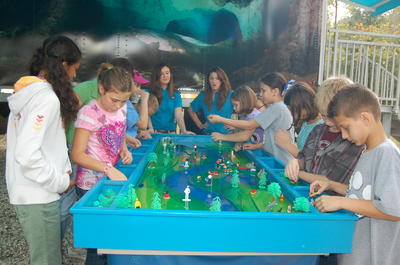Academic Standards

Main Ideas and Academic Benchmarks have been highlighted by the fact that all programs are aligned to Next Generation Sunshine State Standards (NGSSS) and National Science Foundation (NSF) standards. Below you will find the standards for both the Pre/Post Exhibit Activites as well as the Outreach Vehicle itself.
Pre/ Post-exhibit Activities:
LA.3-5.1.6.1: The student will use new vocabulary that is introduced and taught directly.
SC.3.L.15.1:Classify animals into major groups(mammals, birds, reptiles, amphibians, fish arthropods, vertebrates and invertebrates, those having birth and those which lay eggs) according to their physical characteristics and behaviors.
SC.4.E.6.3: Recognize that humans need resources found on Earth and that these are either renewable or nonrenewable
SC.4.E.6.6: Identify resources available in Florida (water, phosphate, oil, limestone, silicon, wind and solar energy).
SC.5.E.7.2: Recognize that the ocean is an integral part of the water cycle and is connected to all of Earth’s water reservoirs via evaporation and precipitation processes.
SC.4.N.1.1: Raise questions about the natural world, use appropriate reference materials that support understanding to obtain information (identifying the source), conduct both individual and team investigations through free exploration and systematic investigations, and generate appropriate explanations based on those explorations.
SC.4.P.10.4: Describe how moving water and air are sources of energy and can be used to move things.
SC.4.P.8.2: Identify properties and common uses of water in each of its states.
SC.5.N.1.1: Define a problem, use appropriate reference materials to support scientific understanding, plan, and carry out scientific investigations of various types such as: systematic observations, experiments requiring the identification of variables, collecting and organizing data, interpreting data in charts, tables, and graphics, analyze information, make predictions, and defend conclusions.
SC.5.P.8.2: Investigate and identify materials that will dissolve in water and those that will not and identify the conclusions that will speed up or slow down the dissolving process.
SC.6.N.1.1: Define a problem from the sixth grade curriculum, use appropriate reference materials to support scientific understanding, plan and carry out scientific investigations of various types, such as systematic observations or experiments, identify variables, collect and organize data, interpret data in charts, tables, and graphics, analyze information, make predictions, and defend conclusions.
SC.6.N.1.4: Discuss, compare, and negotiate methods used, results obtained, and explanations among groups of students conducting the same investigations.
SC.7.E.6.6: Identify the impact that humans have had on Earth, such as deforestation, urbanization, desertification, erosion, air and water quality, changing the flow of water.
SC.7.N.1.1: Define a problem from the seventh grade curriculum, use appropriate reference materials to support scientific understanding, plan and carry out scientific investigations of various types, such as systematic observations or experiments, identify variables, collect and organize data, interpret data in charts, tables, and graphics, analyze information, make predictions, and defend conclusions.
Interior/ Exterior Truck Exhibits:
SC.3.E.6.1: Demonstrate that radiant energy from the sun can heat objects and when the sun is not present, heat may be lost.
SC.3.L.14.1: Describe structures in plants and their roles in food production, support, water and nutrient transport, and reproduction.
SC.3.L.17.2: Recognize that plants use energy from the sun, air and water to make their own food.
SC.3.N.1.1: Raise questions about the natural world, investigate them individually and in teams through free exploration and systematic investigations, and generate appropriate explanations based on those explorations.
SC.3.N.1.6: Infer based on observation.
SC.3.N.3.2: Recognize that scientists use models to help understand and explain how things work.
SC.3.N.3.3: Recognize that all models are approximations of natural phenomena; as such, they do not perfectly account for all observations.
SC.3.P.8.3: Compare materials and objects according to properties such as size, shape, color, texture, and hardness.
SC.3.P.9.1: Describe the changes water undergoes when it changes state through heating and cooling by using familiar scientific terms such as melting, freezing, boiling, evaporation, and condensation.
SC.4.E.6.3: Recognize that humans need resources found on Earth and that these are either renewable or nonrenewable.
SC.4.E.6.6: Identify resources available in Florida (water, phosphate, oil, limestone, silicon, wind and solar energy).
SC.4.L.17.4: Recognize ways plants and animals, including humans, can impact the environment.
SC.4.N.1.3: Explain that science does not always follow a rigidly defined method (“the scientific method”) but that science does involve the use of observations and empirical evidence.
SC.4.N.1.4: Attempt reasonable answers to scientific questions and cite evidence in support.
SC.4.N.3.1: Explain that models can be three dimensional, two dimensional, an explanation in your mind, or a computer model.
SC.4.P.10.4: Describe how moving water and air are sources of energy and can be used to move things.
SC.5.E.7.2: Recognize that the ocean is an integral part of the water cycle and is connected to all of Earth’s water reservoirs via evaporation and precipitation processes.
SC.5.E.7.5: Recognize that some of the weather-related difference, such as temperature and humidity, are found among different environments, such as swamps, deserts, and mountains.
SC.5.P.10.2: Investigate and explain that energy has the ability to cause motion or create change.
SC.5.P.8.1: Compare and contrast the basic properties of solids, liquids, and gases such as mass, volume, color, texture, and temperature.
SC.5.P.9.1: Investigate and describe that many physical and chemical changes are affected by temperature.
SS.4.C.2.1: Discuss public issues in Florida that impact the daily lives of its citizens.